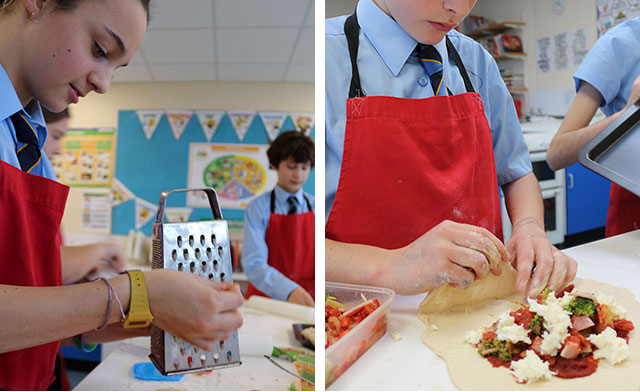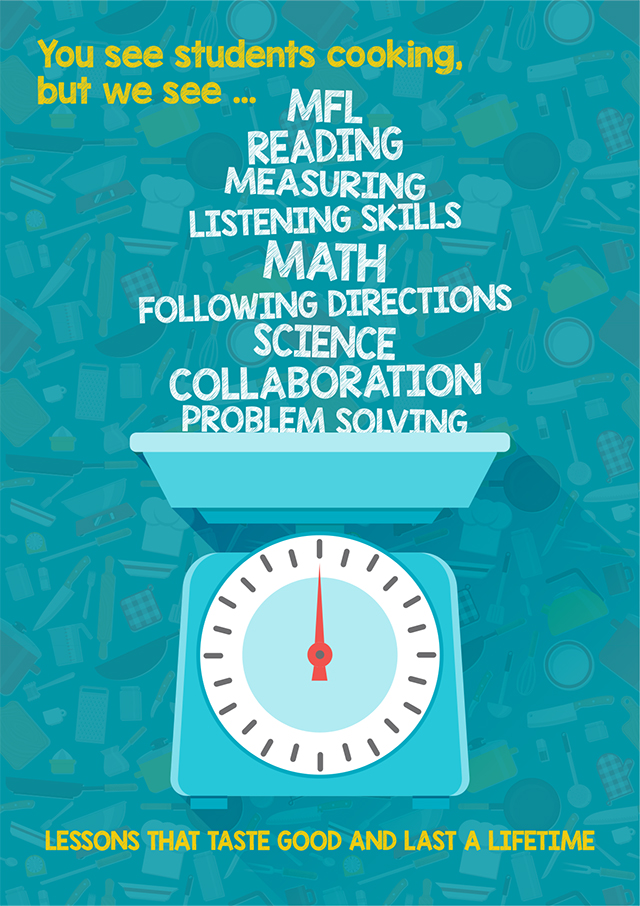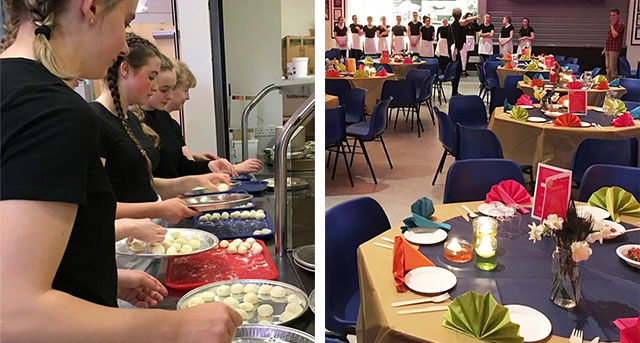First we eat, then we do everything else’ – MFK Fisher 1908-92
The Food department is a thriving, creative and ambitious environment where students are supported, encouraged and challenged to achieve their full potential. We believe in a hands-on approach and that students should learn through practical application and experience. Students learn a wide variety of practical cooking skills with the emphasis on savoury dishes, many of which have multicultural influences. We aim to ignite a love of food amongst our students.
‘If you really want to make a friend, go to someone’s house and eat with them…the people who give you their food give you their heart’ – Cesar Chavez 1927-1993
Alongside the practical element we teach the fundamentals of nutrition, food safety and hygiene to ensure that our students are knowledge rich to make sound and informed food choices.
‘To eat is a necessity, but to eat intelligently is an Art’. – Francois de la Rochefoucauld 1613-168

We aim to improve the health, happiness and well-being of the school community, teaching pupils ways to establish lifelong healthy and sustainable eating habits.
‘One cannot think well, love well, sleep well, if one has not dined well’
– Virginia Woolf 1882-1941
Food education is compulsory at KS3 and our students are fortunate to study Food for 1 lesson each week for the whole of KS3. This allows us to equip our students with essential life skills. It also allows us the time to develop positive experiences of food and cooking.
Our students have the opportunity to continue their Food education journey with Hospitality and Catering at KS4. We have strong links with hospitality employers who work closely with us and provide opportunities such as masterclasses and further career development.
The Food department is well equipped with two large practical classrooms that are fully fitted with domestic kitchens and a Food demonstration classroom. We are very fortunate to be supported by a technician.

At KS3 students have 2 lessons per fortnight in Food. They learn about food commodities, the impact food has on our health and how to prepare and skilfully cook nutritious meals. We encourage an awareness of special dietary requirements and adapt recipes to suit family’s needs. Developing knowledge about the functions of ingredients, their working characteristics and chemical properties supports how food is produced in order to become informed and thoughtful food consumers. Practical food skills are an integral part of the curriculum.
Year 7
In Year 7 we start with introducing safe and hygienic working in the kitchen along with personal hygiene. Students learn how to identify hazards and are made aware of potential risks and preventative measures that we put in place.
We focus on building a foundation of sound cooking skills such as the safe use of the hob, oven and knives including the bridge and claw technique, frying, kneading, shaping, rolling and baking. The recipes that we have chosen allows our students to develop these skills and become confident in the kitchen and we ensure that students have the opportunity to revisit skills and apply them in a variety of recipes, many of which have a multicultural influence.
Students prepare and cook ingredients to make a wide range of predominantly savoury dishes such as couscous salad, salsa and nachos, scones, pizza swirls, vegetable fritters, savoury rice, soda bread, bread rolls, falafel and fruit pies.
We teach students the Eatwell Guide and the basics of nutrition. Every demonstration and practical lesson reinforces the theory of nutrition, healthy eating, function of ingredients, food science – the effect cooking and preparation on ingredients, modifications, seasonality and food miles.
Year 8
In Year 8 we build on developing student’s knowledge and practical application of Food Safety and Hygiene by learning about key food safety temperatures and control measures required to ensure that the food we produce is safe to eat. Students learn about types of bacteria, conditions required to multiply and food they are found in. This is linked to a range of commodities such as beef, poultry, eggs and dairy, pulses and starchy carbohydrates.
The Eatwell guide is taught in further detail in Year 8 and we look at each individual food group and the nutrition they provide. Deficiencies and excesses of each nutrient is covered. The practical sessions are chosen to support the teaching of the Eatwell guide and each food group.
As in Year 7, we teach the function of specific ingredients, such as eggs, yeast and flour and the principles of Food Science in each practical.
Students cook a range of savoury multicultural dishes that build on the foundation practical skills they developed and mastered in Year 7. Dishes include bolognaise, curry, chilli con carne, flatbreads and bean dip, focaccia, bread based pizza, mac and cheese and chow mein. Sweet dishes focus students on specific high level practical skills such as fruit upside down pudding by the creaming method, shortcrust pastry for mini tarts by the rubbing in method and flaky pastry for sausage rolls.
We encourage our students to modify and adapt recipes to suit their and their family’s tastes, preferences and dietary requirements.
Year 9
We have developed the Year 9 Food curriculum to allow our students the opportunity to extend their practical skills and knowledge to a higher level which is closer to GCSE standard.
We continue with food hygiene and safety in greater depth looking specifically at the food safety system HACCP and how we can apply it in our cooking. Knife skills, methods of cooking, time planning, presentation skills – culinary art, food science, the Eatwell Guide, nutrition and health are topics that are interleaved throughout Year 9.
All of our recipes are linked to multicultural influences and students enjoy learning, tasting and cooking food from around the world.
‘Tomatoes and oregano make it Italian; wine and tarragon make it French. Sour cream makes it Russian; lemon and cinnamon make it Greek. Soy sauce makes it Chinese; garlic makes it good.’ - Alice May Brock
We cook dishes such as paella, tartiflette, fougasse, calzone, chicken en croute, sweet and sour, spring rolls and homemade pasta – ravioli.
Key Stage 4
Students can choose to study the GCSE equivalent Level 1/2 Award Hospitality and Catering. This course is a natural progression from the practical and knowledge rich courses at KS3.
The Hospitality and Catering course focuses on industry practices and their application. There is a strong practical element where skills are developed to a high level.
Throughout Year 10 we build on the prior knowledge and skills gained in KS3. There is a focus on the development of a wide range of high level practical skills whilst teaching the theory of the Hospitality Industry. This allows us to interleave much of the theoretical knowledge with practical application so it makes it accessible and real for the students. Dishes that we cook include ratatouille and a modified Italian bread, eggs benedict – hollandaise and homemade breakfast muffins, potato accompaniments such as dauphinoise, duchess, hasselback, choux buns, pate sucree and crème patisserie, portioning and jointing pheasant to make pheasant bruschetta and pheasant meatballs, focaccia, sweet enriched bread – cinnamon swirls, pasta- tortellini, lasagne, chicken and ham or fish pie.
We are very fortunate that our Food students are given the opportunity to be involved in large catering events (Curry Night 2018 in conjunction with The Friends of Budehaven), community projects (Budehaven Festive Triangle), Budelicious Food Festival, Hospitality Table Cornwall and The Taste of Game (BASC)

In Year 10 we focus on Unit 1 which is 40% of the final mark. Students sit the written paper in the Summer of Year 10.
Learning Objective 1:
- The environment in which hospitality and catering providers operate
- We learn about the structure of the industry, job requirements and job roles and factors that affect the success of a hospitality and catering business.
Learning Objective 2:
- How hospitality and catering provisions operate
- We learn about the operation of a professional kitchen, the front of house and customer requirements.
Learning Objective 3
- How hospitality and catering provision meets health and safety requirements
- We learn about personal safety responsibilities, legislation such as Health and Safety at Work Act, RIDDOR, COSHH, PPER, risks to personal safety in the industry and control measures.
Learning Objective 4
- How food can cause ill health
- We learn about bacteria, microbes, chemicals, metals, poisonous plants, allergies and intolerances can cause ill health.
- The role and responsibilities of the Environmental Health Officer
- Food safety legislation such as the Food Safety Act
- Common types of food poisoning – Campylobacter, Salmonella, E – Coli, Listeria, Bacillus cereus, Staphylococcus aureus, and the symptoms of ill health
In Year 11, our focus is on Unit 2 which is 60% of the course.
This is the practical and coursework (NEA) assessment. In the February of Year 11 students take their 3 hour practical assessment which showcases the practical skills that they have developed throughout the course.
Unit 2 consists of the following objectives:
Learning Objective 1
- Students learn about the importance of nutrition when planning menus
- Function of nutrients in the human body
- Compare nutritional needs of specific groups such as children, adults, older adults, medical conditions, special diets.
- Explain the characteristics of unsatisfactory nutritional intake – deficiencies and excesses.
- Explain how cooking methods impact on nutritional value – boiling, steaming, baking, stir frying & poaching.
Learning Objective 2
- Students understand menu planning
- Explain factors to consider when proposing dishes for menus – seasonality, skills, equipment, time, provision, costs
- Explain how dishes on a menu address environmental issues – conservation of water and energy, 3 Rs, sustainability, food miles, provenance.
- Explain how menu dishes meet customer needs – nutritional, organoleptic, cost.
- Plan for the production of several dishes for a menu – sequencing, timing, mise-en-place, cooking, cooling, hot holding, presentation and serving.
Learning Objective 3
- Be able to cook dishes
- Learn how to use techniques in preparation of commodities – weighing, measuring, chopping, shaping, peeling, whisking, sieving, segmenting, slicing, hydrating, blending, melting, rubbing-in.
- Learn how to assure quality of commodities to be used in food preparation – smell, touch, sight, packaging.
- Learn how to use techniques in cooking of commodities – Boiling, blanching, poaching, braising, steaming, baking, roasting, grilling (griddling), frying, chilling, cooling, hot holding.
- Be able to complete dishes using presentation techniques - portion control, position on serving dish, garnish and creativity.
- Use food safety practices throughout their practical sessions.






